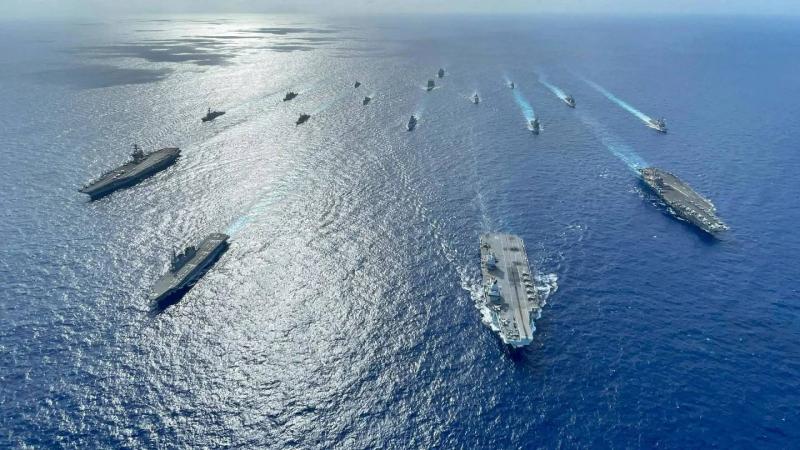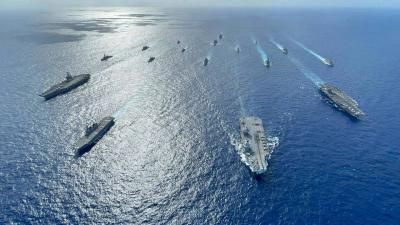Four regional sources and two Iranian sources told Reuters on Saturday that "leaders from the Iranian Revolutionary Guard and the Lebanese group 'Hezbollah' are present in Yemen to help direct and oversee Houthi attacks on shipping in the Red Sea." The four regional sources indicated that Iran, which has armed, trained, and funded the Houthis, has intensified its arms supplies to the group following the outbreak of the war in Gaza, after the Hamas movement, supported by Iran, attacked Israel on October 7.
The sources added that "Tehran has provided advanced drones, anti-ship cruise missiles, ballistic missiles capable of striking targets with precision, and medium-range missiles to the Houthis, who began targeting commercial ships in November in solidarity with the Palestinians in Gaza." All sources stated that "leaders and advisors from the Iranian Revolutionary Guard also provide expertise, data, and intelligence to determine which of the dozens of ships passing through the Red Sea daily are headed to Israel and constitute targets for the Houthis."
Washington stated last month that Iran plays a significant role in planning operations targeting navigation in the Red Sea, and that its intelligence is crucial in enabling the Houthis to target ships. In response to a request for comment on this story, the White House referred to its previous public comments on how Iran supports the Houthis.
Iranian Foreign Ministry spokesperson Nasser Kanani has repeatedly denied Tehran's involvement in Houthi attacks in the Red Sea during weekly press conferences. The Iranian Revolutionary Guard's public relations office did not respond to a request for comment. Houthi spokesperson Mohammed Abd al-Salam also denied any involvement from Iran or Hezbollah in directing attacks in the Red Sea. Hezbollah did not respond to a request for comment.
The Houthis, who emerged in the 1980s as an armed group opposing Saudi Arabia's Sunni religious influence in Yemen, claim they support Hamas by attacking commercial ships linked to or heading towards Israeli ports. Houthi attacks have harmed international shipping operations between Asia and Europe through the Bab el-Mandeb Strait off Yemen. This has led the United States and Britain to conduct airstrikes on Houthi targets in Yemen, which has opened a new front in the conflict linked to the war in Gaza.
The Gaza conflict has also triggered clashes between Israel and Hezbollah militants along the Lebanese border, as well as attacks by Iranian-linked groups on American targets in Iraq and Syria. An informed Iranian source told Reuters: "The Revolutionary Guard is assisting the Houthis with military training (on advanced weapons)." The source added, "A group of Houthi fighters was in Iran last month and was trained at a Revolutionary Guard base in central Iran to learn about new technology and use missiles."
The source indicated that Iranian leaders have also traveled to Yemen and established a command center in the capital Sana'a for Red Sea attacks, managed by a senior Revolutionary Guard commander concerned with Yemen.
Regional Strategy
Analysts noted that "the Red Sea attacks align with Iran's strategy aimed at expanding and mobilizing its regional Shiite network of armed factions to demonstrate its influence and ability to threaten maritime security in the region and beyond." They added that "Tehran wants to show that the Gaza war could inflict significant losses on the West if it continues and could have disastrous implications for the region amid escalating tensions."
Abdulaziz Al-Saqer, head of the Gulf Research Center, stated that "the Houthis do not act independently," basing this conclusion on a careful analysis of the group’s capabilities, which are estimated to be around 20,000 fighters. He added, "The Houthis, in terms of personnel, experience, and capabilities, are not that advanced." He pointed out that "dozens of ships cross Bab el-Mandeb daily, and the Houthis do not have the means, resources, or knowledge, including satellite information, needed to identify and strike a target."
In turn, White House National Security spokesperson Adrienne Watson stated last month that "the tactical intelligence provided by Iran has played a crucial role in enabling the Houthis to target ships." According to two sources who were previously part of the Yemeni army, there is a clear presence of members of the Iranian Revolutionary Guard and Hezbollah in Yemen. They stated: "These are responsible for supervising military operations, training, and reassembling smuggled missiles into Yemen as separate parts."
A senior regional source tracking Iran, who spoke on the condition of anonymity, noted that "the political decision is made in Tehran while Hezbollah manages and oversees the Houthis in Yemen."
Weapons and Advice
Houthi spokesperson confirmed that "the group's goal is to target Israeli ships heading to Israel, without causing any human casualties or significant material damage." He added that American and British airstrikes on Yemen would not force the group to back down. He stated, "We do not deny that we have a relationship with Iran, and that we have benefited from Iranian experience in terms of manufacturing and military infrastructure, maritime and aerial, and so on... But the decision made by Yemen is an independent decision that has nothing to do with any other party."
However, a security official close to Iran said, "The Houthis have drones and missiles, and everything they need to fight Israel, but they needed guidance and advice regarding shipping routes and ships, which is what Iran provided." When asked about the type of advice Tehran offered, he said it resembled the advisory role Iran plays in Syria, which involves training and overseeing operations as needed. He added: "There are a group of members of the Iranian Revolutionary Guard in Sana'a now to assist in operations."
Iran has sent hundreds of members of the Revolutionary Guard to Syria, in addition to thousands of Hezbollah fighters, to help train fighters from Shiite factions in Afghanistan, Iraq, and Pakistan, and to organize them to prevent the fall of Syrian President Bashar al-Assad during the revolt led by Sunni groups in 2011.
Washington and Gulf countries have repeatedly accused Iran of arming, training, and funding the Houthi group, which belongs to the Zaydi Shia sect and aligns with Tehran within the "Axis of Resistance" opposed to the West and Israel, which also includes Hezbollah and groups in Syria and Iraq.
While Tehran denies having any direct role in the attacks taking place in the Red Sea, the Iranian Supreme Leader Ayatollah Ali Khamenei praised the Houthis, expressing hope that their attacks would continue "until victory."
Training and Equipment
A leader within the coalition of Iran-aligned groups denied the presence of any members of the Iranian Revolutionary Guard or Hezbollah on the ground in Yemen currently. He stated: "A team of military experts from Iran and Hezbollah went to Yemen early in the civil war to train the Houthis and equip them and build their military manufacturing capabilities."
He added: "They came and assisted the Houthis and then left, just like they did with Hezbollah and Hamas," further stating that the military capabilities of the Houthis should not be underestimated. He noted that the Houthis know the terrain and maritime routes well and already possess the systems necessary to attack ships, including precision equipment sent to them by Iran.
During the years of chaos following the Arab Spring uprising in Yemen in 2011, the Houthis tightened their grip on northern Yemen and seized the capital, Sana'a, in 2014, prompting a Saudi-led coalition to intervene militarily months later.
Analysts explained that when Hamas attacked Israel, Iran had no choice but to show support for the Palestinian group after years of anti-Israel rhetoric, but it was wary of involving Hezbollah in the conflict for fear of severe retaliation from Israel.
Yemeni researcher from the Sana’a Center for Strategic Studies, Al-Iryani, noted that "a major war between Israel and Hezbollah would be catastrophic for Lebanon and threaten the future of the group, which has become the most important in the Iranian 'Axis of Resistance’." He added, "The Houthis, in contrast, are in a strategically advantageous position to create a significant impact by disrupting global maritime activity without expending much effort."




